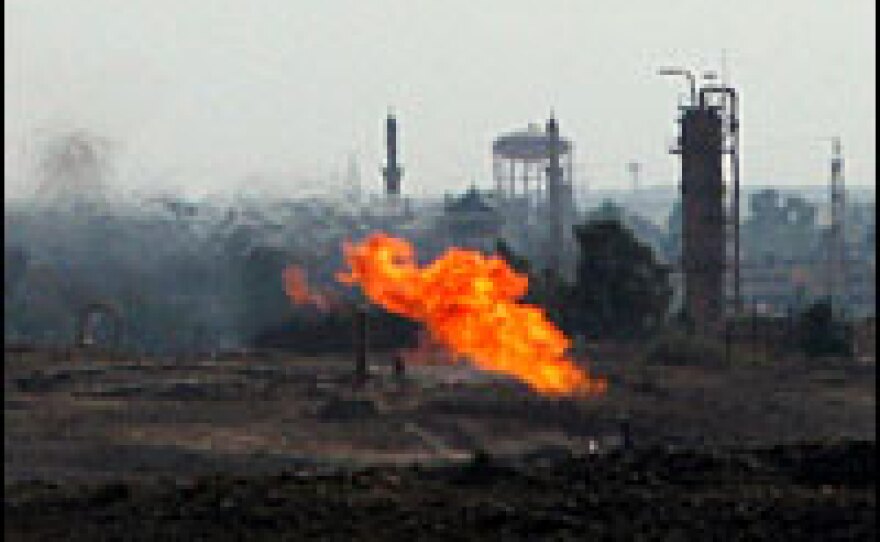

The northern Iraqi city of Kirkuk has become a symbol for one of the country's most intractable problems — the debate over who should control Iraq's oil riches and the conflict among its major ethnic groups.
The dispute over control of Kirkuk prevented Iraq's parliament from passing a law authorizing provincial elections. Although the law finally passed late last month, the issue of Kirkuk was not resolved, only postponed.
The first thing a visitor sees when approaching Kirkuk from the north is a tower of flame — a colossal flare, burning off the gas from what is estimated to be the sixth-largest reserve of oil in the world, more than 8.5 billion barrels of crude.
The potential wealth has made Kirkuk a tormented city ever since oil was discovered in 1927. Today, the city's three main ethnic groups, Kurds, Arabs and Turkmens, are vying for demographic and political control.
"If you look at history, you'll find that Kirkuk has always been part of Kurdistan," says Rebwar Falq al-Talabani, who serves as deputy chairman of the Kirkuk Provincial Council. Talabani reflects the views of his fellow Kurds, who claim the city as their own, but he says he favors a temporary solution that the Iraqi parliament imposed on the city.
Demographic Disputes
Elections in Kirkuk will be delayed until a commission sorts out who is a legitimate resident and who is eligible to vote. That's not as easy as it sounds, because former dictator Saddam Hussein tried to change the demographics of the city by forcing Kurdish families out and replacing them with Arabs, who were thought to be more loyal to his regime.
Mohammed Khalil al-Jobouri, an Arab member of the provincial council, says the degree of Saddam's "Arabization" program in Kirkuk has been exaggerated.
"Saddam Hussein brought in no more than 50,000 Arabs over a period of more than 30 years," Jobouri says. "But since 2003, some 650,000 Kurds have been settled here."
Jobouri's numbers can't be confirmed, but he is repeating an often-heard charge made by the Arabs and Turkmens: They say that while Saddam expelled thousands of Kurds during his time, the Kurds are now using the same tactics, trying to change the political landscape by bringing in thousands of Kurds who never belonged there.
"The Kurdish political parties didn't learn any lesson from Saddam Hussein," says Ali Sadik, a Turkmen. "They accused him of being an oppressor, and here they are doing the same thing."
Good-Faith Cooperation Needed
Sadik is an official of the Turkmeneli Party, one of several that represents Turkmens in the city. Like the others, he asserts that his ethnic group has a historical claim to Kirkuk, and he says they won't get fair representation until the real population figures have been sorted out.
It is very difficult to assess what the real population numbers are, but Iraq's parliament has named a committee to try. Talabani, the Kurd, says there are ways to figure it out, including inspecting ID cards going back as far as 1957 and checking old voting lists and even ration cards.
The politicians from all three ethnic groups say this approach could work if — and only if — each group cooperates in good faith. The problem, all three agree, is that now, at least, no group trusts the others.
A senior official at the U.S. Embassy in Baghdad calls Kirkuk a "headline issue" — a symbol of fundamental problems facing all of Iraq. The official, who was not authorized to speak on the record, says that for Kurds, Kirkuk represents Kurdish autonomy; for the Arabs, Arab unity; and for the Turkmens, a place in Iraq's political system.
The U.S. official says he thinks the issue is not really about oil, since Kurdish leaders have said they would accept a revenue-sharing plan that would share Kirkuk's oil but also give them access to the revenues from Iraq's giant southern oil fields.
Kirkuk As An Example
The official noted that the U.N. is working on a series of options for solving the Kirkuk issue and is expected to deliver its suggestions soon. Meanwhile, he said he believes that at the local level in Kirkuk, there are politicians willing to work in good faith for a fair solution.
Arab representative Jobouri agrees, but he says time is running short.
"Kirkuk is the key to solving all Iraq's problems," he says, "and it's also the problem that could complicate everything else in Iraq."
Above it all, the giant gas flare outside Kirkuk burns night and day, a symbol of the riches that have been hidden beneath the city for millennia.
Copyright 2022 NPR. To see more, visit https://www.npr.org. 9(MDAzMjM2NDYzMDEyMzc1Njk5NjAxNzY3OQ001))






